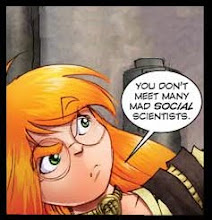What to Do When You Have Trolls On Your Face
I just had some off-line correspondence with a fellow blogger who was rather upset at the direction a comment thread had taken on Lisa Goldman’s On the Face blog, which we both agree is one of the warmest, most human and kind-hearted blogs in the Middle East. My colleague was feeling rather discouraged, and couldn't think of what to suggest to enable Lisa to “take back” her comment board. I sent the following reply:
I’m a bit of a veteran of various forms of Internet unpleasantness; I’ve seen flame wars on the Internet Breast Cancer List (my first wife died of the disease in 1999, after seven years of treatment); barefoot-horse lists; Israel Insider and other forums; and of course on blog comment forums. I don’t know that I have magic answers, but I can make a few general observations: 1) Nobody ever got a discussion to stop being unpleasant by yelling at the trolls. Trolls like to be yelled at; it encourages them. By “yelling” here, I mean even the gentlest, most polite forms of rebuke; anything that can be construed as paying attention to them encourages trolls. Talking about them in the third person doesn’t help either! 2) Trolls, even when they posture as sincere discussants, are never really interested in learning anything, hearing what the other side has to say, or otherwise participating in a genuine two-way (or multi-way) discussion. They are there only to argue their own point, and to do so unpleasantly. There is absolutely no point in trying to educate a troll. 2a) Occasionally a troll will briefly impersonate a genuine discussion participant, politely asking you to explain your point of view or otherwise trying to seem civilized. In my experience, if you think (as I know I tend to think, being basically a Panglossian type), “Oh good, Mister Troll is deciding to be reasonable and open-minded now; I’ll respond nicely to encourage his change of heart!” you are bound to be disappointed. The troll will simply waste your time; you’ll write long and insightful messages that Mister Troll will read only to find ammunition to use against you, and the troll will soon return to being as nasty as ever. It’s a classic abuse scenario, really; and just as the abused spouse needs to learn not to be taken in by the abuser’s occasional “caring” behavior, forum participants need to understand that a troll is a troll is a troll. 3) The one thing that is likely to discourage a troll is to “waste” his time. If his stuff never gets posted, or if it gets posted and then is rapidly deleted, the troll will go away and spew his stuff elsewhere. In the case of a “runaway” discussion like the one on Lisa’s blog, I would suggest enabling comment moderation at the first sign of trouble, and then disabling it (on a trial basis) when it looks like the troll has given up and gone elsewhere. Fast and heavy-handed deletion is the next best thing; but preventing the troll’s stuff from seeing the light of day in the first place is the best bet. (One problem with comment moderation is that it requires someone to be available if legitimate comments are to appear on a timely basis. A possible solution, or at least an amelioration, might be to set up small circles of bloggers, so that at any given time one of them is “on call” to moderate comments for anyone who is going to be unavailable for a while. I don't know if anyone has actually tried this for blogs, but I've seen similar ideas work for email lists.)





0 Comments:
Post a Comment
<< Home